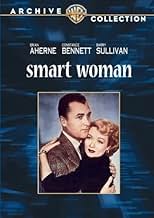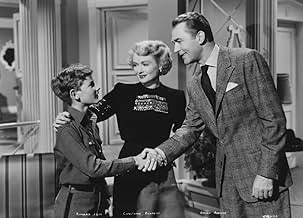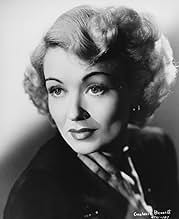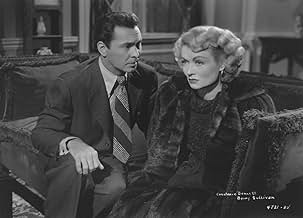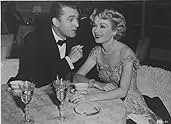AVALIAÇÃO DA IMDb
6,2/10
266
SUA AVALIAÇÃO
Adicionar um enredo no seu idiomaA crusading district attorney, Robert Larrimore, butts heads in court with defense attorney Paula Rogers.A crusading district attorney, Robert Larrimore, butts heads in court with defense attorney Paula Rogers.A crusading district attorney, Robert Larrimore, butts heads in court with defense attorney Paula Rogers.
- Direção
- Roteiristas
- Artistas
- Prêmios
- 1 vitória no total
Netta Packer
- Undetermined Minor Role
- (cenas deletadas)
Walter Walker
- Undetermined Minor Role
- (cenas deletadas)
Iris Adrian
- Newspaper Columnist
- (não creditado)
Fred Aldrich
- Policeman in Courtroom
- (não creditado)
Jimmy Ames
- Bellhop
- (não creditado)
Phil Arnold
- Husband
- (não creditado)
Avaliações em destaque
In her middle-age, the charming comedienne Constance Bennett, a big star in the early 1930s, both starred and produced this 1948 post-war film. Her company spared no money on this film's excellent production values. Released by Allied Artists, once Monogram, this doesn't look at all like one of their usual cheapies. The sets and set-dressing, the casting of all major and minor roles, are up to the best big studio standards, particularly in the unusual shadowy B&W cinematography of Stanley Cortez, best known for similar lighting in The Magnificent Ambersons. Sadly, despite the many excellent talents involved before and behind the camera, it all doesn't go together. The Russian-born director, Edward Blatt, does a competent job, but it's not his fault. Blame it ultimately on a script that tries too hard to mix romance, courtroom drama, suspense, and comic relief. Brian Ahern and Constance don't quite create enough heat to make the love story work. The rest of the film is just ordinary.
Constance Bennett's career seemed to be on the skids by the 1940s, which saw her appearing in B-movies and supporting roles. By 1948, she was producing her own films (she also produced Paris Underground in 1945). Both of these films are well-made late career entries for a fading star.
In Smart Woman, Bennett is supported by a strong cast, which includes Brian Aherne and Barry Sullivan, plus a host of reliable supporting players such as Otto Kruger (whom I remember as the older man opposite Joan Crawford in Chained) and Selena Royle (also opposite Joan Crawford in Damned Don't Cry).
The script is intelligent if not a roaring success. The chemistry between Bennett and her co-stars does not run particularly hot, but Bennett does get a chance to wear some gorgeous Adrian gowns and prove she is still a good-looking woman at the (then) advanced age of 43. The photography is polished and Bennett seems to be lit and photographed very, very carefully. There are even some noirish camera angles and shadow play. Bennett's performance is strong and does not appear dated with any evidence of her days as a silent film star. Her style seems contemporary, although Bennett is no longer the hypnotic beauty of her precode heyday.
As Bennett's second production effort, it is a solid vehicle for her, and an interesting film overall, but it was just not powerful enough to give her career any boost. After this, it was all supporting roles. But the film can easily be recommended as a glossy, well-made women's picture. If the film had a low budget, it's impossible to tell.
In Smart Woman, Bennett is supported by a strong cast, which includes Brian Aherne and Barry Sullivan, plus a host of reliable supporting players such as Otto Kruger (whom I remember as the older man opposite Joan Crawford in Chained) and Selena Royle (also opposite Joan Crawford in Damned Don't Cry).
The script is intelligent if not a roaring success. The chemistry between Bennett and her co-stars does not run particularly hot, but Bennett does get a chance to wear some gorgeous Adrian gowns and prove she is still a good-looking woman at the (then) advanced age of 43. The photography is polished and Bennett seems to be lit and photographed very, very carefully. There are even some noirish camera angles and shadow play. Bennett's performance is strong and does not appear dated with any evidence of her days as a silent film star. Her style seems contemporary, although Bennett is no longer the hypnotic beauty of her precode heyday.
As Bennett's second production effort, it is a solid vehicle for her, and an interesting film overall, but it was just not powerful enough to give her career any boost. After this, it was all supporting roles. But the film can easily be recommended as a glossy, well-made women's picture. If the film had a low budget, it's impossible to tell.
A special prosecutor trying to clean up the town and a lady lawyer tangle in court, but get romantically involved on the outside.
Lowly Allied Artists (Monogram) assembled an A-list cast, pretty good production values, but then put a no-name director (W. Blatt) with all of 3 directorial credits in charge. The results are flatter than they should be, and I suspect his lack of a sure hand is partially to blame. Unfortunately, Bennett who can be quite sparkling is deadly serious here, somewhat out of sync with Aherne's lighter touch, while I suspect wisecracking O'Shea (Johnny) and the droll Gleason (Corkle) were brought in to liven things up. And, of course, on the sinister side there's that grinning old cobra Otto Kruger as the crooked D.A..
The plot's pretty complicated with an unexpected twist near the end. I couldn't figure out, however, whether the storyline was supposed to be a drama with comical overtones or a romantic comedy with dramatic overtones. Either way, it's a mild disappointment given the cast and battery of writers. (In passing—note that Bennett's lady lawyer wears a hat in court while defending her client. This may be the only time I've seen an officer of the court wearing a hat while court is in session. Nothing hangs on this; I'm just curious.)
Lowly Allied Artists (Monogram) assembled an A-list cast, pretty good production values, but then put a no-name director (W. Blatt) with all of 3 directorial credits in charge. The results are flatter than they should be, and I suspect his lack of a sure hand is partially to blame. Unfortunately, Bennett who can be quite sparkling is deadly serious here, somewhat out of sync with Aherne's lighter touch, while I suspect wisecracking O'Shea (Johnny) and the droll Gleason (Corkle) were brought in to liven things up. And, of course, on the sinister side there's that grinning old cobra Otto Kruger as the crooked D.A..
The plot's pretty complicated with an unexpected twist near the end. I couldn't figure out, however, whether the storyline was supposed to be a drama with comical overtones or a romantic comedy with dramatic overtones. Either way, it's a mild disappointment given the cast and battery of writers. (In passing—note that Bennett's lady lawyer wears a hat in court while defending her client. This may be the only time I've seen an officer of the court wearing a hat while court is in session. Nothing hangs on this; I'm just curious.)
Constance Bennett is the "Smart Woman" in this 1948 film, and Brian Aherne is the attorney on the opposite side who falls in love with her.
Due to a corrupt political machine, the DA (Otto Kruger) has refused to indict on several cases. For that reason, a special prosecutor, Robert Larrimore (Aherne) is brought in. Larrimore and attorney Paula Rogers (Bennett) face off in court, and Larrimore falls for her right away and begins dating her. When the DA is killed, mobster Frank McCoy (Barry Sullivan) is arrested, and he appeals to Paula to help him. Larrimore will be trying for the state, and Paula has reason to fear that the situation will hurt their relationship.
This is a pretty good movie, though it's easy to figure out Paula's problems very early on. The cast is good, with a mix of '30s stars like Aherne, Bennett, Kruger, character actors like James Gleason and John Eldredge, as well as '40s newcomers Sullivan and O'Shea (who married Virginia Mayo).
The film was produced by Bennett herself, who was no longer the big star she had been in the '30s, thanks to now being 43 years old. The supporting roles for her had started in 1940 with "Two-Faced Woman," when she was 36. Fortunately things are better for women now, but age has always been a huge issue for women in Hollywood. Bennett, a luminous beauty in the '30s, is a good example. Bennett was an excellent businesswoman, and her reputation for glamor served her well in her cosmetics business and also a clothing business. She worked tirelessly during the war effort and, married to a general, entertained the troops who stayed overseas after WW II (she was an accomplished singer). She also did a nightclub act.
"Smart Woman" is not as good as Bennett's other production, Paris Underground, but it's serviceable.
Due to a corrupt political machine, the DA (Otto Kruger) has refused to indict on several cases. For that reason, a special prosecutor, Robert Larrimore (Aherne) is brought in. Larrimore and attorney Paula Rogers (Bennett) face off in court, and Larrimore falls for her right away and begins dating her. When the DA is killed, mobster Frank McCoy (Barry Sullivan) is arrested, and he appeals to Paula to help him. Larrimore will be trying for the state, and Paula has reason to fear that the situation will hurt their relationship.
This is a pretty good movie, though it's easy to figure out Paula's problems very early on. The cast is good, with a mix of '30s stars like Aherne, Bennett, Kruger, character actors like James Gleason and John Eldredge, as well as '40s newcomers Sullivan and O'Shea (who married Virginia Mayo).
The film was produced by Bennett herself, who was no longer the big star she had been in the '30s, thanks to now being 43 years old. The supporting roles for her had started in 1940 with "Two-Faced Woman," when she was 36. Fortunately things are better for women now, but age has always been a huge issue for women in Hollywood. Bennett, a luminous beauty in the '30s, is a good example. Bennett was an excellent businesswoman, and her reputation for glamor served her well in her cosmetics business and also a clothing business. She worked tirelessly during the war effort and, married to a general, entertained the troops who stayed overseas after WW II (she was an accomplished singer). She also did a nightclub act.
"Smart Woman" is not as good as Bennett's other production, Paris Underground, but it's serviceable.
Smart woman... a great description for film star constance bennett herself! Chronologically speaking, she made this one about halfway through her career... 1948. Bennett is paula, an attorney and a mother. Co-stars brian aherne, barry sullivan, who were both huge film stars at the time. Keep an eye out for james gleason, who always seemed to play police captains... sometimes smart, sometimes dumber than rocks. Paula finds herself on the other side of a case from larrimore ( aherne), who is young and dashing. They fall in love, but are both dedicated to their roles as attorneys. Can they both stay true to their profession, and still be in love? It's sometimes over the top, but quite good. Highlights some basic truths about ethics, right and wrong. Good stuff. Directed by ed blatt. Only directed three films, and this was his last. Check out the bio on constance bennett... she really was an amazing lady.
Você sabia?
- CuriosidadesIn this movie, James Gleason plays a character named 'Sam Corkle'. In "Here Comes Mr. Jordan" (1941) and "Down To Earth" (1947), he plays a character named 'Max Corkle'.
- Citações
Paula Rogers: An indictment is not a conviction.
- ConexõesFeatured in Falcon Crest: Dark Passion (1987)
Principais escolhas
Faça login para avaliar e ver a lista de recomendações personalizadas
Detalhes
- Tempo de duração1 hora 33 minutos
- Cor
- Proporção
- 1.37 : 1
Contribua para esta página
Sugerir uma alteração ou adicionar conteúdo ausente

Principal brecha
By what name was O Segredo de uma Mulher (1948) officially released in India in English?
Responda
